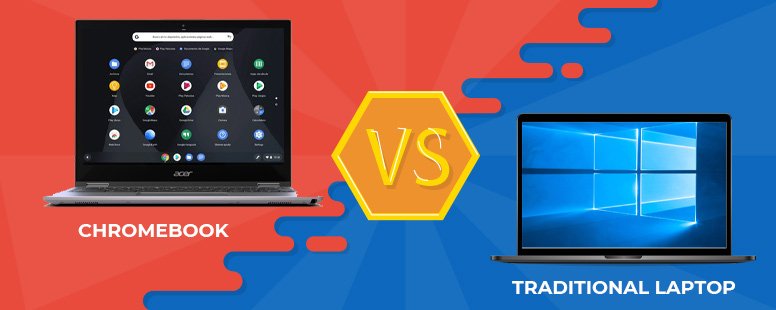
Deciding between a Chromebook and a traditional laptop (running Windows or macOS) is a common dilemma. While they may look similar on the outside, their fundamental differences in operating systems and design philosophies lead to very different user experiences. The best choice for you depends entirely on how you plan to use your computer.
Chromebooks
A Chromebook is a laptop that runs on Google’s Chrome OS, an operating system primarily based on the Chrome web browser. It’s designed to be fast, simple, and secure, with a strong reliance on cloud-based services.
Pros:
- Affordability: Chromebooks are generally much more budget-friendly than traditional laptops. You can find capable models for under ₹40,000, making them an excellent choice for students, children, or users with basic needs.
- Speed and Simplicity: Chrome OS is a lightweight operating system that boots up in seconds and runs very smoothly, even on less powerful hardware. The interface is clean and intuitive, making it very easy for new users to navigate.
- Long Battery Life: Due to their efficient operating system and low-power components, Chromebooks typically offer excellent battery life, often lasting 10-12 hours on a single charge.
- Security: Chromebooks have multiple layers of built-in security, including automatic updates and a “sandboxing” feature that isolates web pages from the rest of the system. This makes them highly resistant to viruses and malware.
- Cloud Integration: They are designed to work seamlessly with Google’s ecosystem, including Google Docs, Sheets, and Drive. Your files are automatically saved to the cloud, making them accessible from any device.
Cons:
- Limited Offline Functionality: While modern Chromebooks have improved in this area, they still function best with a stable internet connection. Many core applications and features are cloud-dependent.
- Software Limitations: This is the biggest drawback. Chromebooks cannot run traditional desktop software like Adobe Photoshop, Microsoft Office (the full desktop version), or specialized engineering and design programs. You are limited to web-based applications, Android apps from the Google Play Store, and some Linux apps.
- Less Powerful Hardware: Most Chromebooks come with less powerful processors and minimal local storage, as they are not designed for intensive tasks like video editing, gaming, or running resource-heavy applications.
- Gaming: Gaming on a Chromebook is limited to mobile games from the Google Play Store or cloud gaming services like GeForce NOW and Xbox Cloud Gaming. They are not suitable for running most modern PC games.
Traditional Laptops
Traditional laptops run on a full-featured operating system like Microsoft Windows or macOS, offering a complete computing experience.
Pros:
- Software Compatibility: This is the traditional laptop’s greatest strength. They can run virtually any software, from professional creative suites (Adobe Creative Cloud) to specialized engineering programs and a vast library of games.
- Performance and Power: With a huge range of hardware options, you can find a traditional laptop that can handle any task, from simple web Browse to intensive 4K video editing and high-end gaming.
- Hardware Flexibility: The Windows ecosystem, in particular, offers endless choices in terms of brands, designs, and price points. Many models also allow for user-upgradable RAM and storage.
- Gaming: Windows is the dominant platform for PC gaming, with the largest library of games and support for the latest and most powerful dedicated graphics cards.
- Offline Functionality: Traditional laptops are fully functional offline, with all your files and applications stored locally.
Cons:
- Higher Price: Laptops with good performance and build quality are typically more expensive than Chromebooks.
- Varying Quality: The wide variety of manufacturers can lead to inconsistent build quality, performance, and user experience.
- Potential for Bloatware: Many Windows laptops come with pre-installed, unnecessary software from the manufacturer.
- Maintenance: They can be more susceptible to viruses and malware, often requiring users to be more diligent about security updates and antivirus software.
The Verdict
- Choose a Chromebook if: Your primary tasks are web-based (email, Browse, streaming), you use Google’s productivity suite, you have a tight budget, and you value simplicity, security, and long battery life. They are an excellent choice for students and casual users.
- Choose a Traditional Laptop if: You need to run specific software that isn’t web-based, you’re a gamer, a content creator, or a professional who requires powerful performance, or you often work offline and need ample local storage.

